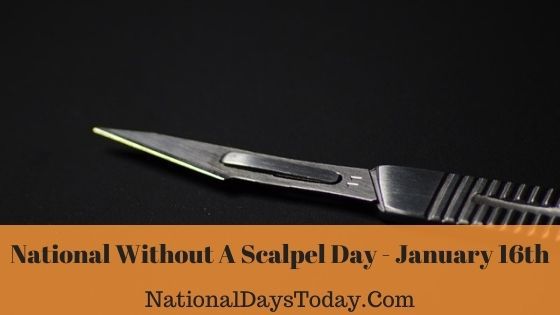National Without A Scalpel Day
National Without A Scalpel Day:
Celebrated annually on 16th January, National Without A Scalpel Day is observed to create awareness regarding the revolutionary minimally invasive procedures and its benefits. Let’s look back with gratitude towards the service of the scalpels while enjoying every other technological advancement for surgery today!
| Year | Date | Day | Where |
| 2021 | 16th January | Saturday | United States |
| 2022 | 16th January | Sunday | United States |
| 2023 | 16th January | Monday | United States |
Twitter Hashtags:
#NationalWithoutAScalpelDay
#WithoutAScalpelDay
Related: Other National Days Celebrated on January 16th:
National Religious Freedom Day
Why National Without A Scalpel Day?
There is no darkness without light, no happiness without sorrow, and no surgery without a scalpel. Surgery and scalpel were inseparable partners in rescue missions for centuries. Before the arrival of scalpel-like instruments, the primitive tools that were used on the human body include sharks tooth, bamboo shoots, and prepared to be grossed out- fingernails! One of the earliest elective procedures such as circumcision was done using sharpened flintstone…ouch! The flintstones were succeeded by metal knives.
In 400BC Hippocrates the Father of Medicine first described the concept of a surgical knife by comparing it to “Machaira”, a Lacedaemonian sword. The sword had a broad-cutting blade with a single edge and a sharp point. Even today, these attributes are considered essential features of instruments like the modern-day scalpel. In Rome, similar instruments were used by Galen and Celsus for advanced procedures like tendon repair, incision and drainage, and vivisections. The Romans named these precise instruments as scallpellus.
The surgical blades continued to evolve throughout the centuries with features like specialized tips, foldable blades, etc. Dr. John Murphy’s adaptation of the Gillette razors into a surgical tool was yet another ingenious development. The cumbersome practice of blade interchange with additional equipment was sorted out by a 22-year-old engineer, Morgan Parker by his two-piece-blade invention.
Scalpel became an inevitable instrument in every surgery until Dr. Charles Dotter had to face a challenging case in 1964. His 82-year old patient suffering from blockade of the superficial temporal artery refused the leg amputation modality followed in such cases. He utilized imaging techniques to visualize the site of and dilated the artery using a guidewire and Teflon catheters, restoring the circulation. The woman walked away from the hospital on her two legs with only a band-aid and a smile. Dr. Dotter hence performed the first minimally invasive Image-guided angioplasty.
Dr. Dotter’s innovation was the stepping stone to a new branch in the medical field known as Minimally invasive Image-guided Procedure (MIIP). Nowadays many medical conditions like aneurysms, fibroids, and heart diseases are treated with pin-hole openings and medical imaging techniques that negate the use of scalpels.
MIIP is superior to invasive surgeries in almost every aspect. The Imaging technique eliminates guesswork and guides the surgeon to the operation site. The wounds at the surgical site are also minimal and reduce the chances of infection and scarring.
Even when cutting-edge medical techniques are developing, lack of awareness among the general population may lead to no reduction in the stitches, scars, and scalpel stories. Scalpel Day is a great opportunity to inform and explore alternative treatment options.
Through these endeavors, patients can make informed decisions and avoid invasive diagnosis. As the years go by, we can hope for more breakthroughs in the medical field and finally leave the scalpels for slick hairstyles!
How Can We Observe National Without A Scalpel Day?
- Knowledge Is Safety
Educate your friends and family regarding the various minimally invasive treatment options available and help them to make safer decisions in their hour of need.
- Be A Life-Scar Saver
If you are a health professional, get trained in minimally invasive procedures, and be an asset to the medical community.
- Share On Social Media
Share the story of Dr. Dotter and the successful angioplasty, articles, and experiences regarding minimally invasive procedures and shout out using #NationalWithoutAScalpelDay and #WithoutAScalpelDay.
Interesting Facts About National Without A Scalpel Day:
Here are some interesting facts surrounding National Without A Scalpel Day!
- Sound can cut through your skin! Ethicon 300 Harmonic scalpel employs sound waves to incise soft tissues with add-ons like hemostatic cutting and coagulation.
- Dotter’s significant contributions earned him the title “Father of Interventional Radiology”. The automatic X-Ray Roll Film that produces two images per second was one of his inventions.
- In 1964 Dr. Dotter defined a historic moment in the medical fraternity by performing the first angioplasty. The technique of opening vessels using dilating catheters was named after him and is known as “Dottering.”
- Without A Scalpel is a documentary series produced by the non-profit organization Interventional Initiative. The documentary features real-life stories of patients and doctors who opted for a life-changing procedure, MIIP’s.
History Of National Without A Scalpel Day:
The National Without A Scalpel Day was proposed by the Interventional Initiative in 2005 to create awareness of the revolutionary MIIP procedures and thereby empower people to make informed healthcare decisions.


